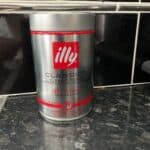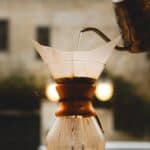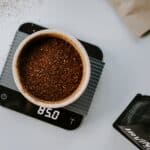15 Best Coffee Beans for French Press
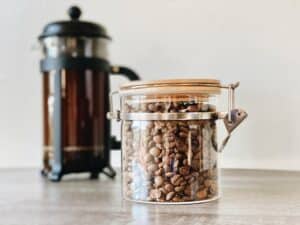
The French press is one of the most simple, easy to use and most popular coffee brewing devices in the world! The best coffee beans for French press must be the star of the show, since it is such a simple method of brewing coffee. It is so widely used for good reason. The simplicity of adding ground coffee and hot water to the French press, letting it brew and then enjoying your hot cup of Joe is very appealing to many.
However, just because you know how to use a French press, doesn’t necessarily mean you can always brew great coffee time after time. Afterall, making great coffee starts with using high quality beans. In fact, factors like roast, origin, flavour profiles and grind size all play into how your French press coffee will end up tasting.
So, let’s take a closer look at the ins and out of what makes great coffee for the French press, and the best coffees for the job!
What is a French Press?
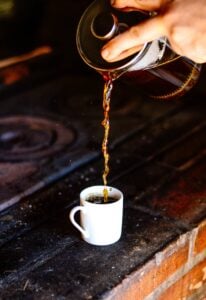
A French press is a relatively new device in the history of coffee, despite it being a staple in households around the world. French presses are relatively simple devices to use, since there are so few moving parts. Made simply from a glass container and a mesh plunger, it works by pouring freshly boiled water over coarsely ground coffee beans.
Then, the coffee grounds are left to steep and brew for a few minutes, before using the filter in the plunger to stop the ground coffee entering your awaiting cup.
Why Use a French Press?
There are so many different ways to brew coffee, but the French press is one of the simplest, most scalable ways to make delicious java.
French presses come in a range of different sizes, so you can easily scale up your brewing ratios to make great coffee for a crowd.
A French press is also a very versatile way to make coffee from home. It is an inexpensive piece of brewing equipment that can make coffee to your desired strength very easily.
Whilst the French press is a relatively simple way to brew coffee, there is actually more to it than meets the eye. Many people don’t use the right coffee beans, over or under extract their coffee or even risk damaging their French press!
Learn how to use the French press properly, step by step here.
Immersion Brewing
The main element of the French press that makes it different from a lot of other brewing methods is the fact that it uses immersion rather than percolation to make your coffee.
Immersion brewing occurs when all of the coffee grounds come into contact with all of the water in your container. This means the grounds infuse the water slowly, which is why a French press should be left to brew for a little longer than other ways of making coffee.
Immersion brewing also requires coarser grounds than percolation brewing, which uses the process of hot water being poured over more finer grounds to extract the coffee infused liquid.
Percolation is a much more common method of brewing coffee. Think pour over, V60, espresso and of course percolators.
What to Consider When Picking Coffee Beans for Your French Press

Now, before we dive into the 15 best coffee bean choices for French press, let’s tackle some of the key considerations you should make before you go out and buy your beans.
How Will You Be Drinking Your French Press Coffee?
One of the first things to work out before you decide which coffee beans to buy, is how you’ll actually be drinking your French press coffee.
This may sound like an obvious question, but it is actually quite an important factor to consider when you are thinking about the flavour profile, origin and roast you use.
Since the French press uses immersion brewing rather than percolation, you’ll be grinding your coffee beans more coarsely. The reason for this, is that rather than the water passing over the grounds once and that’s that, the ground coffee beans and water hang out together for an extended brewing time.
This is also why you’ll want to use a coarser grind with a French press compared to many other brewing methods. If you use a fine grind in a French press, you’ll end up with over extracted, bitter coffee that just doesn’t taste very good.
The immersion brewing method also means you’ll more often than not get a stronger cup of coffee using a French press (when brewed long enough), than the equivalent drip brew for example.
With this in mind, you’ll want to use coffee beans that play into this method of coffee extraction, so their natural flavours can be accentuated.
However, not everyone loves a strong coffee in the morning…
If you like to enjoy your coffee with milk and or sugar, and like a particularly strong, full bodied bean that will contrast well with these, then opting for a more bitter tasting bean will work well.
However, if you will be drinking your coffee black with no sweetener and you don’t want it quite as strong, but still want to use your French press, then opting for a more subtle tasting coffee bean would make more sense.
Flavour Profiles
The flavour profile of the coffee beans used in your French press of course makes a huge difference to the way your end product will taste.
Whilst there isn’t a wrong type of coffee for French press, some flavour notes lend themselves better to this brewing method than others.
Since the French press uses immersion rather than percolation to brew coffee, it tends to produce full bodied, strong tasting coffee.
With this in mind, most people prefer to use a coffee with flavour notes of chocolate, nuts and caramel when brewing with a French press. This is because these flavours lend themselves better to a full bodied brew, whereas more citrus and fruity flavours can come across sour when brewed with immersion.
Origins
Coffee origins can be a bit of a complicated topic. There are so many different factors about growing coffee beans that play into the way they taste. Elevation, soil quality, climate, proximity to other crops and the way the beans are washed all play into the overall taste.
That being said, when it comes to coffee beans that deliver a robust body, with deep nutty, smokey and chocolate flavours, look for beans from South American countries like Colombia, Peru, Costa Rica. Beans there are generally wet processed and offer nutty, earthy flavours.
Also, try to look for beans from Sumatra (the famous Indonesian Island), as Sumatran coffee beans are notoriously earthy and full bodied.
Roasts
Medium and dark roasted Arabica coffee beans tend to be more popular when it comes to brewing in a French press, because the immersion method of brewing brings out their full body and deep flavours more.
These beans work especially well when you drink your coffee with milk and sugar or sweetener, as they contrast well with these additives.
The issue with using a lighter roast in a French press, is not necessarily that it will make the coffee taste bad, but more that you’ll lose the subtleties of the coffee’s original flavour.
Lighter roasts tend to have more delicate and complex flavour profiles. Tasting notes like fruit, flora and citrus tend to be more prevalent in lighter roasts. Therefore, using immersion brewing just means you’re not getting the best out of these beans, since the French press will mingle all of these flavours and get a bit lost in the process.
Grind Size
Another factor that plays into the way your French press coffee will taste is grind size. How fine or coarse you grind your coffee beans will differ between brewing methods, as the way the coffee flavour is extracted varies.
In the case of the French press, the immersion extraction process calls for a coarser grind, since the water and coffee grounds are mingling together throughout the entire brewing process.
15 Best Coffee Beans for French Press
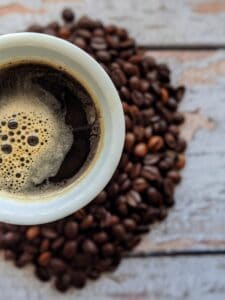
So, now we have discussed the main factors to consider when choosing high quality coffee beans for French press, let’s dive into the 15 best coffee beans you should try out today! All of the options listed below are in whole bean form, so you have the flexibility to grind them however you like.
1. Copper Moon Sumatra Blend
- Roast: Dark
- Origin: Sumatra
- Flavours: Smokey, Roasted Almonds, Herbal
Copper Moon’s Sumatran blend is a punchy, dark roasted coffee beans that is the perfect companion for the French press. You’ll get a very full body, earthy and smokey flavour notes with a hint of nuttiness, that is strong but also well rounded. Sumatran coffee has a reputation for being high quality, full bodied and smooth. Copper Moon definately delivers!
2. Kicking Horse Grizzly Claw
- Roast: Dark
- Origin: Central and South America Blend
- Flavours: Dark Chocolate, Cocoa, Roasted Hazelnut
Kicking Horse coffee has a reputation for strong, high quality coffee and their Grizzly Claw blend does not dissapoint! These organic, dark roasted coffee beans are perfect for French press, thanks to their blend of earthy flavours. They are roasted in the Rocky mountains and are sure to bring a smokey, delcious flavour to your humble French press!
3. Green Coffee Traders Hawiian Kona Coffee
- Roast: Medium
- Origin: Hawaii
- Flavours: Milk Chocolate, Caramel, Hazelnut
Kona coffee is not easy to come by, but if you can get your hands on it, you’re in for a real treat! These medium roasted Kona coffee beans by Green Coffee traders are top quality, full bodied and have a delicate flavour. They make a great companion to your French press and come in a gift style bag!
4. Volcanica Bolivia Peaberry
- Roast: Medium
- Origin: Bolivia
- Flavours: Sweet Cocoa, Chocolate, Sweet Nuts
Volcanica coffee’s Bolivian Peaberry beans offer a sweet, subtle aroma that is a little more reserved than some of the punchy dark roasts on this list. Peaberry coffee is high quality and unique in flavour, so you’ll get a fantastic tasting experience from these high altitude grown beans.
5. Lifeboost Medium Roast
- Roast: Medium
- Origin: Nicaragua
- Flavours: Chocolate, Sweet Cocoa, Woody
This classic tasting single origin coffee from Lifeboost is a great option for French press brewers. The subtle chocolate and sweet cocoa flavour notes, cut with an undertone of earthy woodiness makes for a deep, full bodied cup of coffee. Lifeboost is a low acid coffee, so is also easy on your stomach!
6. Coffee Kult Dark Roast
- Roast: Dark
- Origin: Mixed (Columbia, Guatemala and Sumatra)
- Flavours: Caramel, Cinnamon, Sweet Nuts
Coffee Kult dark roasted coffee beans are sure to wake you up in the morning! Their rich, smooth, bold flavours combine to make a robust, impactful cup of coffee! Coffee Kult roast their beans to order, so you’ll always get a perfectly fresh batch!
7. Intelligentsia El Gallo
- Roast: Dark
- Origin: Variable
- Flavours: Cocoa, Molasses, Cola
One of the sweeter tasting dark roated coffee beans on this list is El Gallo by Intelligentsia. Their signature blend comes from a range of different locations, since they harvest and roast beans throughout the year depending on seasonality. So, you’ll never get the exact same coffee beans from Intelligentsia, but their quality control, direct trade ethos and precision roasting techniques mean you’ll always get great quality no matter when you buy!
8. Equator Coffee Equator Blend
- Roast: Medium to Dark
- Origin: Blend (Kenya, Sumatra, Colombia, Brazil)
- Flavours: Chocolate, Nutmeg, Marzipan
Equator coffee’s signature blend of medium to dark roasted coffee is perfect for your French press. The bold flavours with subtle sweetness on the aftertaste makes this a versitile but delicious coffee. Equator coffee roast their beans to order, so you’ll always get optimum freshness!
9. Stumptown French Roast
- Roast: Dark
- Origin: Mixed (Central and South America)
- Flavours: Jam, Toffee, Bittersweet Chocolate, Cloves
Stumptown’s French roast is perfect for French press! The full bodied, smokey flavours like cloves are cut with a nice sweet mix of toffee, jam and chocolate to make a delicious morning brew. Their direct trade model also means better prices for farmers and a more ethical coffee growing process!
10. Bulletproof Coffee French Kick
- Roast: Dark
- Origin: Guatemala and Colombia
- Flavours: Smokey, Chocolate, Nuts
Bulletproof coffee is becoming a well known coffee brand for good reason. Their committment to high quality, ethically sourced coffee beans makes them resonate with their customers. Bulletproof’s French Kick coffee is a great choice for French press brewing, thanks to its dark roast and smokey, chocolate flavours.
11. Verena Street Sunday Drive Decaf
- Roast: Medium
- Origin: Mixed Blend
- Flavours: Smokey, Bittersweet Nuts, Dark Chocolate
Verena Street Sunday Drive Decaf coffee is a bittersweet medium roasted blend that is ideal for an afternoon French press that won’t keep you up at night!
12. Lavazza Super Crema
- Roast: Medium
- Origin: Mixed (Arabica and Robusta Beans)
- Flavours: Hazelnut, Brown Sugar, Floral
Lavazza Super Creama is a unique drinking experience. The blend of 60% Arabica and 40% Robusta beans gives Super Crema a strong, smokey but also sweet and nutty flavour. The use of different coffee bean varieties means there is a mix of delicate aromas from the Arabica beans, coupled with the increased caffiene content and bold body of the Robusta beans.
13. Peet’s Major Dickinson Blend
- Roast: Dark
- Origin: Mixed Blend
- Flavours: Smokey, Spicy, Roasted Nuts
Peet’s Major Dickinson Blend is one of the more bitter coffee bean options on this list. it will pair well with your French press and definately wake you up in the morning!
14. San Francisco Bay Fog Chaser
- Roast: Medium and Dark
- Origin: Central and South America
- Flavours: Smokey, Smooth Chocolate, Nuts
San Fransisco Bay Fog Chaser coffee combines medium and dark roasted beans to deliver a bold, but smooth flavour. With a smokey but bittersweet taste, the Fog Chaser is a well balanced bean that suits the French press well.
15. Coffee Bros Costa Rica
- Roast: Medium
- Origin: Costa Rica
- Flavours: Cocoa, Toffee, Lemon
The Coffee Bros Costa Rica medium roasted coffee is a subtle tasting blend of sweetness and cirtus. It is best served black or with just a dash of milk, as the flavours are relatively subtle for a medium roast
Top Tips to Improve Your French Press Coffee
Now we’ve discussed the 15 best coffee bean options for French press, here are a few top tips to ensure you make great coffee every time!
Clean Your French Press Regularly!
One of the most overlooked aspects of French press coffee brewing is actually maintaining and cleaning the device. Just because a French press is a simple coffee brewing method, doesn’t mean it shouldn’t be looked after!
Remember to clean your mesh filter, plunger and glass container regularly with warm soapy water, as they can all easily become stained from old coffee. This can leave a bitter, unpleasant taste in the mouth if left unchecked!
Use Filtered Water
Another great tip to ensure you get great tasting, consistent results when using a French press is to use filtered water. This may sound a bit like overkill, but it will give you a cleaner tasting coffee, that allows you to distinguish the flavour notes more easily.
Steep Your Coffee Longer
Most people make the mistake of not brewing and steeping their French press coffee for long enough. This leads to under extracted, weak coffee that just doesn’t do the French press justice!
Try to exercise patience and brew your French press for at least 10 minutes, agitating and stirring the top crust every now and then. Brewing for this amount of time rather than the usual 2 to 4 minutes will ensure your coffee is fully extracted and strong!
Since the French press’s immersion brewing is quite a forgiving process, it’s difficult to over extract the coffee grounds,especially if you use a grind that’s coarse enough. Therefore, give your coffee grounds plenty of time to steep in your French press, and enjoy the fruits of your labour!
Use the Right Size French Press
Another tip to bear in mind, is to actually use the right size of French press for your desired number of servings.
Whilst French press coffee is strong and the brewing method is quite forgiving overall, you still don’t want to leave your French press sitting for ages after you’ve poured your first cup. This will increase the risk of over extraction, which will result in bitter, unpleasant coffee.
So, if it is just you drinking from your French press, try to use a smaller device or at least only fill your larger French press up halfway. This will ensure you don’t sell yourself short and end up with a suboptimal end product!
Summary
Overall, whilst the French press is one of the most humble, easy to use coffee brewing devices out there, that doesn’t mean you should skimp on quality when it comes to choosing coffee beans!
Picking the right coffee beans for your taste is not always an easy task, so I hope this guide has given you an insight into what factors make a difference when choosing the right coffee for French press.
The list above is just a starting point, but by all means try out some of the beans mentioned and follow my top tips for a better French press coffee experience!
French Press Coffee Beans Frequently Asked Questions
You should use a medium to coarse grind size for French press. This is because of the immersion brewing method that takes place, so using a fine grind will most likely give you bitter, over extracted coffee. Remember through, the coarser you grind, the longer the brewing and extraction process will take!
I would recommend brewing your French press for at least 10 minutes, ideally 15. This will give your coffee plenty of time to extract fully, without becoming too bitter.
Ideally yes, freshly ground coffee beans tend to taste better, retain more flavour and you also have more control over the grind size you want. If you can’t grind your own beans and are buying pre-ground from the store, make sure to get a grind specifically for French press!
Since the French press is already fitted with a metal mesh filter, there is no need to use a paper filter as well. However, if you are worried about sediment reaching your cup and want an extra fine filter, you can use one as well.

